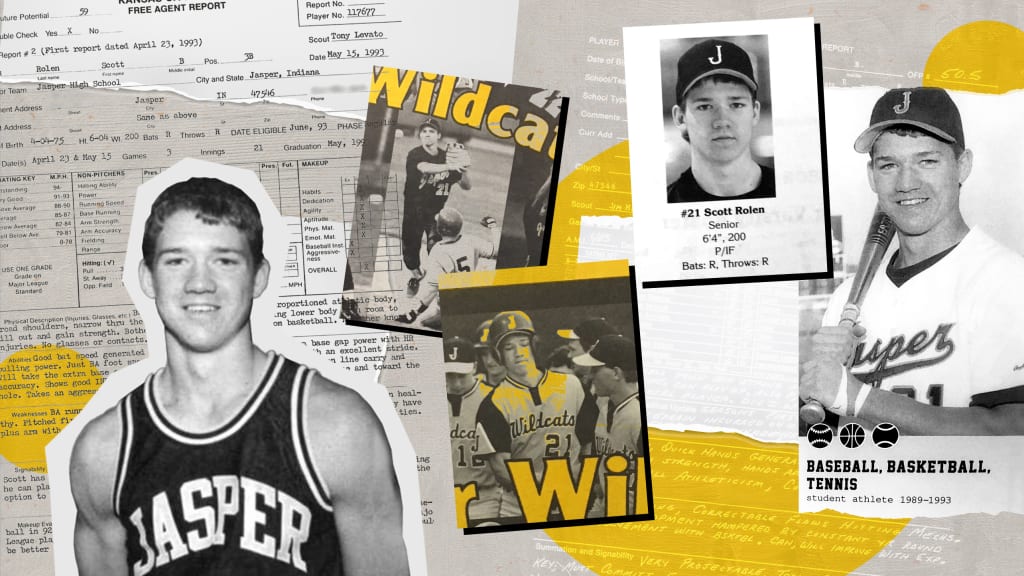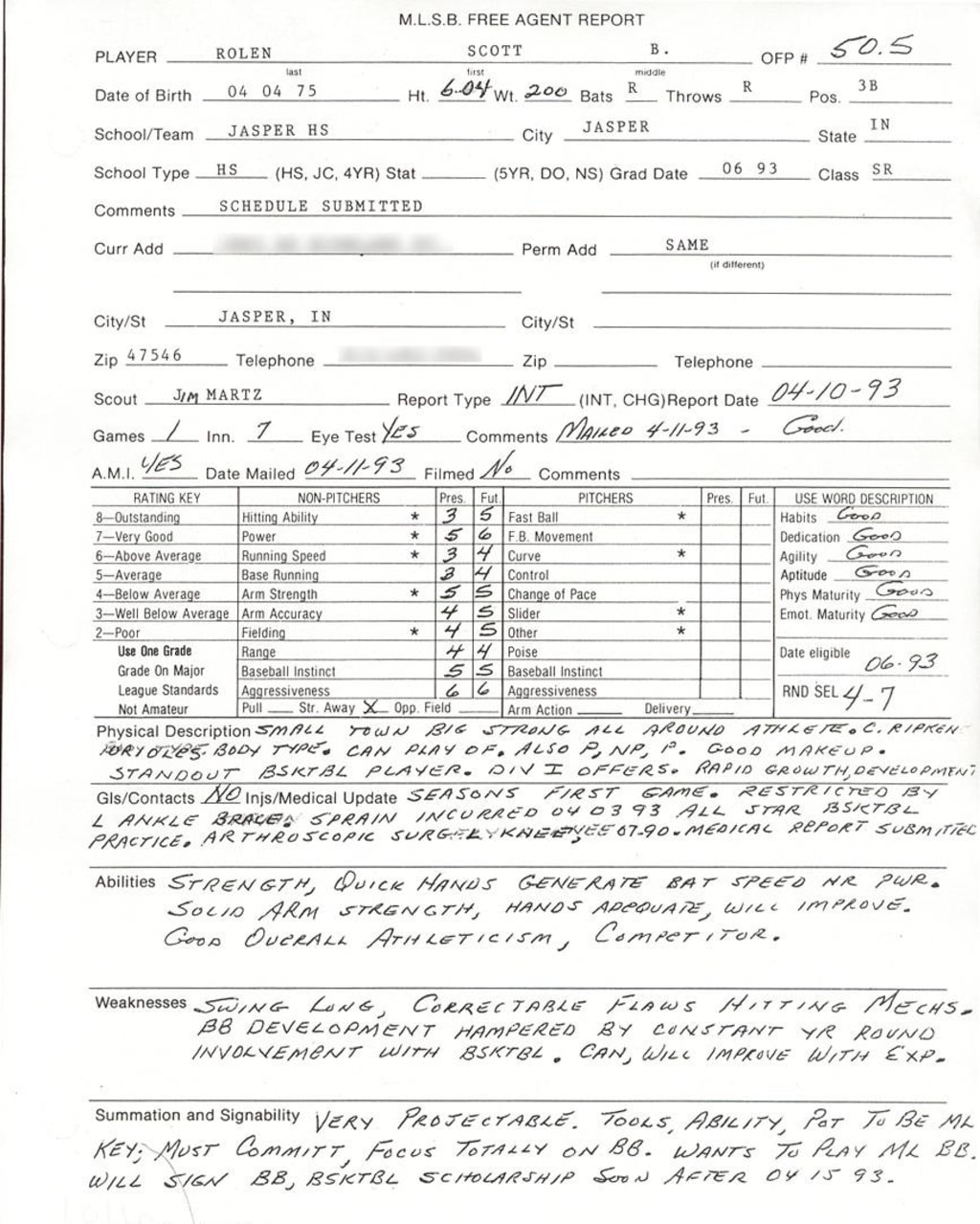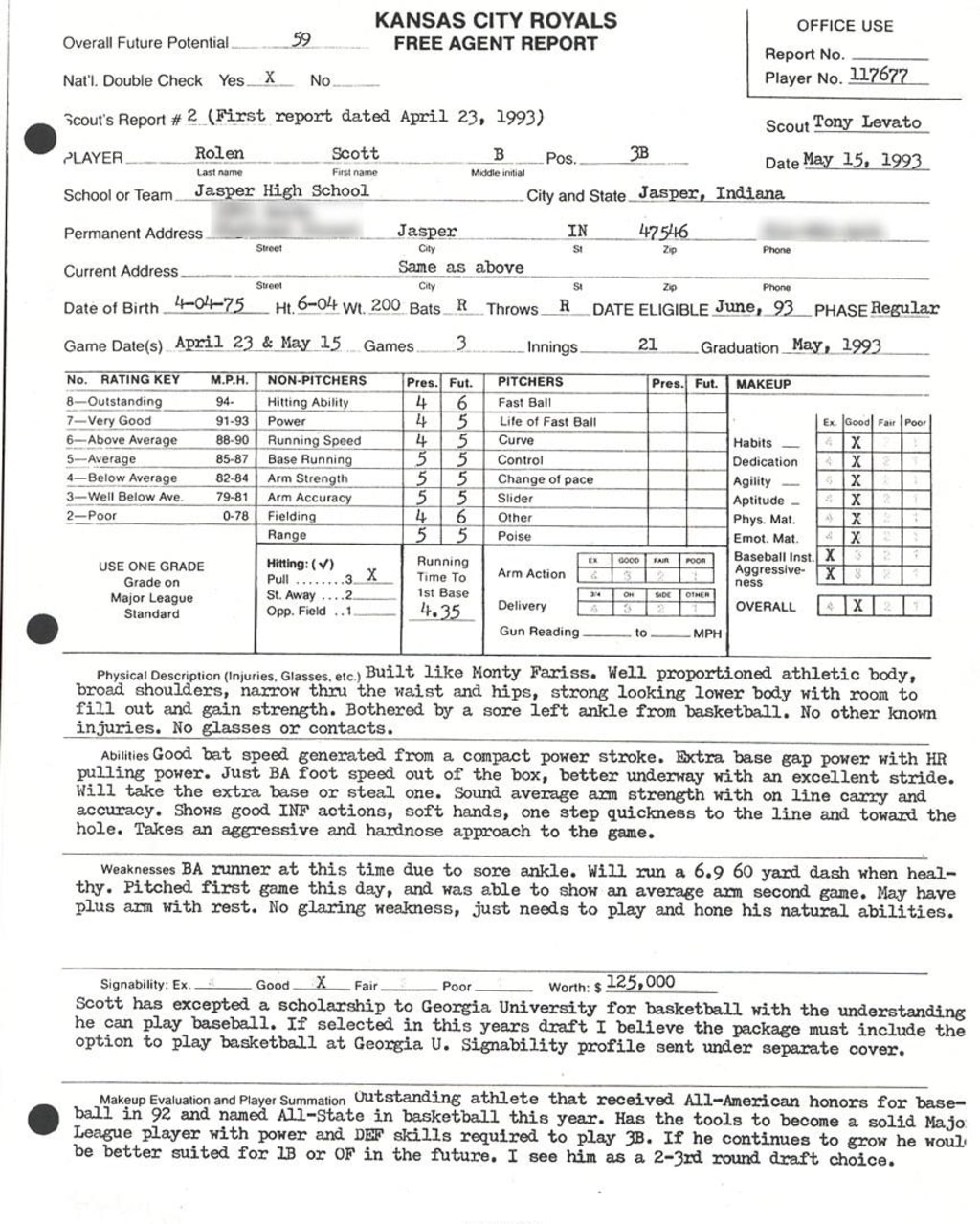On Draft Day 1993, Phillies national crosschecker Marti Wolever called Mariners scouting director Roger Jongewaard. The two had worked together in the past with the Tigers, and Wolever wanted to know Seattle's plans for the No. 1 overall pick as Philadelphia tried to determined whom it would get at No. 4.
Jongewaard said he preferred a five-tool Florida high school shortstop but Mariners manager Lou Piniella wanted more immediate help in the form of Wichita State right-hander Darren Dreifort, and it looked like Piniella would prevail. Conventional wisdom was that the Dodgers and Angels also wanted college arms, so Wolever told his boss, scouting director Mike Arbuckle, "I think we're getting Alex Rodriguez."
Fortunately for Seattle, Jongewaard got his way and A-Rod became a Mariner. Dreifort went to the Dodgers -- and made his pro debut in the big leagues -- kicking off a run of five straight college pitchers that included the Phillies taking Old Dominion's Wayne Gomes. Gomes spent six years in the Majors and served as Philadelphia's closer in 1999, but he didn't come close to approaching Rodriguez's career, not that many players have.
While the Phillies just missed out on getting the best player in the 1993 Draft with their first-round selection, they did get the second-best with their second-rounder. Scott Rolen will enter the Hall of Fame on Sunday, three decades after Philadelphia made him the 46th overall selection out of Jasper (Ind.) High.
It's hard to imagine a player with Rolen's combination of size (6-foot-4 and 200 pounds at age 18) and athleticism lasting 46 picks today, but he played in a different era. Arbuckle said there were two primary reasons why Rolen didn't go earlier in the 1993 Draft.
"There weren't high school showcases back then and Scott was from a small town in southern Indiana," said Arbuckle, who laid the foundation for Philadelphia's 2008 World Series championship club with his 16 drafts for the club and is now a special assistant with the Royals.
"Some teams backed away because they wondered how he'd do against good pitching. The other factor was signability."
A multisport star at Jasper High, Rolen averaged 26.9 points per game and earned all-state honors in basketball as a senior. He had a full scholarship to play shooting guard at the University of Georgia, where he also planned on playing baseball. Both of his parents were teachers and obviously placed a premium on education.

Most clubs felt it would cost too much to sign Rolen away from the Bulldogs, especially considering that he was unproven against good competition.
"A lot of guys thought that basketball commitment was solid so it would be a wasted pick," said Wolever, currently a national crosschecker with the Cubs. "But that's where Scott Trcka was so good. Scott would not give up on him. Without him, this thing doesn't get done."

A Phillies area scout based in Indiana, Trcka first saw Rolen in the summer before his senior year. He didn't create early-round buzz until the following spring, doing so despite an ankle injury that required him to wear a brace throughout the season. He starred at the plate, at third base and on the mound while Trcka marveled at his tools.
"He had hand speed, quickness, athleticism, a cannon for an arm," said Trcka, who has been out of Organized Baseball since his second stint with the Phillies ended when they let him go in 2016. "He could pump it up to 92-93 mph on the mound, just a great arm. Even with his ankle, he still could fly. I can only imagine what he would have been like if he were healthy.
"His instincts on the bases and his instincts in the field were remarkable. He may be the most instinctive player I've ever seen. I remember talking about it with Dick Lawlor, my regional crosschecker, and saying that even though he was going to wind up being a big guy, I think he could play shortstop in the big leagues."
Rolen never did see action at shortstop in the Majors, mainly because he may have played third base better than anyone ever has at that level. He won eight Gold Gloves while making seven All-Star teams and hitting .281/.364/.490 with 316 homers in 17 big league seasons with the Phillies, Cardinals, Blue Jays and Reds.

Trcka remembers rating Rolen's overall future potential as a 58 on the 20-80 scouting scale, grading him as a late first-round talent. The Phillies' scouting braintrust targeted him with their second-round pick and Trcka said the only team that worried him was the Angels, who picked right ahead of them at No. 45. But Rolen and his family wouldn't guarantee that he'd sign and the Angels opted for Brigham Young right-hander Ryan Hancock, who would make just 11 appearances in the Majors.
"They didn't commit to me either," Trcka said. "I asked his father if they'd sign if we offered them a fair amount of money and he said, 'Yeah, probably.' I felt like they were honorable people, so we took that on. Both his parents were educators, so that was a tough row to hoe, but we got it done."
Arbuckle remembers that Trcka kept telling him, "If you take him, I can sign him" -- but Rolen didn't sign quickly. He wanted to play in the Indiana vs. Kentucky high school all-star basketball game at Market Square Arena in late June, and negotiations continued for nearly a month afterward. On July 22, he agreed to turn pro for $250,000, the equivalent of late first-round money.
Rolen quickly emerged as the Phillies' top prospect, reached the Majors at age 21 in 1996 and won the National League Rookie of the Year award the following season. He's the best of the nine big leaguers Trcka signed in a 28-year scouting career, a group that includes two late finds from the same 1993 Draft in 27th-rounder David Doster and 33rd-rounder Kevin Sefcik.
"People don't realize how good Trck was, especially on the back end of the Draft," Wolever said. "He had a great feel for kids and their families. I think the game misses that today but Trck was so good at that."
Arbuckle was running his first draft for the Phillies in 1993, He credits Wolever, whom he hired from the White Sox, and Lawlor and Trcka, whom he inherited on his new staff, for making the Rolen pick happen.
"Trck evaluated the ability, the signability and the makeup and he was right on all three," Arbuckle said. "Dick Lawlor fell in love with him and he and Marti Wolever pushed me to take him. All three guys believed in Scott Rolen and I was lucky enough to listen to them."
